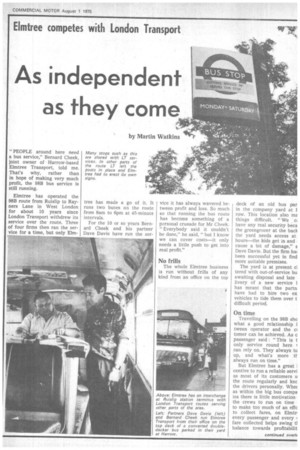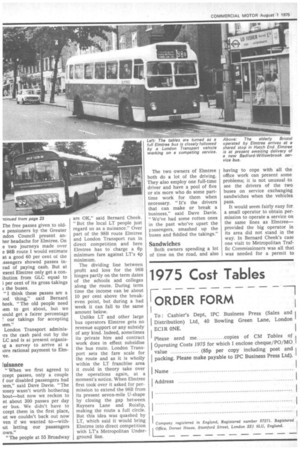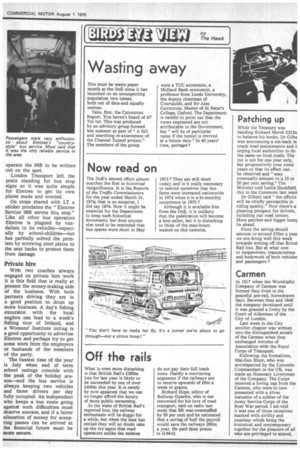As independent as they come
Page 25

Page 26

Page 27

If you've noticed an error in this article please click here to report it so we can fix it.
by Martin Watkins
"PEOPLE around here need a bus service," Bernard Cheek, joint owner of Harrow-based Elmtree Transport, told me. That's why, rather than in hope of making very much profit, the 98B bus service is still running.
Elmtree has operated the 98B route from Ruislip to Rayners Lane in West London for about 10 years since London Transport withdrew its service over the route. Three of four firms then ran the service for a time, but only Elm tree has made a go of it. It runs two buses on the route from Sam to 6pm at 45-minute intervals.
For the 10 or so years Bernard Cheek and his partner Dave Davie have run the ser vice it has always wavered between profit and loss. So much so that running the bus route has become something of a personal crusade for Mr Cheek. "Everybody said it couldn't be done," he said, "hut I know we can cover costs—it only needs a little push to• get into real profit."
No frills
The whole Elmtree business is run without frills of any kind from an office on the top deck of an old bus par in the company yard at I row. This location also ma things difficult. "We ci have any real security beca the greengrocer at the bacla the yard needs access at hours—the kids get in and cause a bit of damage," s Dave Davie. But the firm ha! been successful yet in find more suitable premises.
The yard is at present cl tered with out-of-service bu awaiting disposal and late livery of a new service 1 has meant that the parta have had to hire two ex vehicles to tide them over t difficult period.
On time
Travelling on the 98B she what a good relationship I tween operator and the ci tomer can be achieved. As o passenger said : "This is t only service round here can rely on. They always tu up, and what's more a always run on time."
But Elmtree has a great i centive to run a reliable servi as most of its customers u the route regularly and knc the drivers personally. Whet as within the big bus compa ies there is little motivation the crews to run on time to make too much of an etTc to collect fares, on Elmtn every passenger and every fare collected helps swing ti balance towards profitabilit The free passes given to old e pensioners by the Greater flelon Council present anher headache for Elmtree. On e two journeys made over e 98B route I would estimate at a good 60 per cent ot the ssengers showed passes incad of paying cash. But at esent Elmtree only get a conibution from GLC equal to i per cent of its gross takings the buses.
"I think these passes are a )od thing," said Bernard heek. "The old people need tern to get about, but we kould get a fairer percentage ' our takings for accepting kern."
London Transport adminis!rs the cash paid out by the LC and is at present organisig a survey •to arrive at a lore rational payment to Elm
fuisance
"When we first agreed to ccept passes, only a couple f our disabled passengers had lem," said Dave Davie. "The ioney wasn't worth bothering bout—but now we reckon to et about 300 passes per day ,er bus. We didn't have to ccept them in the first place, ut we couldn't back out now yen if we wanted to—withlut letting our passengers own."
"The people at 55 Broadway are OK," said Bernard Cheek. " But the local LT people just regard us as a nuisance." Over part of the 9813 route Elmtree and London Transport run in direct competition and here Elm tree has to charge a 6p minimum fare against LT's 4p minimum.
The dividing line between profit and loss for the 9813 hinges partly on the term dates of the schools and colleges along the route. During term time the income can be about 10 per cent above the breakeven point, but during a had week it can fall to the same amount below.
Unlike LT and other large bus operators Elmtree gets no revenue support or any subsidy of any kind. Indeed, sometimes its private hire and contract work does in effect subsidise the bus route. London Transport sets the fare scale for the route and as it is wholly within the LT franchise area it could in theory take over the operations again, at a moment's notice. When Elmtree first took over it asked for permission to extend the 98B from its present seven-mile U-shape by closing the gap between Rayners Lane and Ruislip, making the route a full circle. But •this idea was quashed by LT, which said it would bring Elmtree into direct competition with LT's Metropolitan Underground line. The two owners of Elmtree both do a lot of the driving. They also employ one full-time driver and have a pool of five or six more who do some parttime work for them when necessary. "It's the drivers that can make or break a business," said Dave Davie. "We've had some rotten ones in the past who've upset the passengers, smashed up the buses and fiddled the takings."
Sandwiches
Both owners spending a lot of time on the road, and also having to cope with all the office work can present some problems; it is not unusual to see the drivers of the two buses on service exchanging sandwiches when the vehicles pass.
It would seem fairly easy for a small operator to obtain permission to operate a service on the same lines as Elmtreeprovided the big operator in its area did not stand in the way. In Bernard Cheek's case one visit to Metropolitan Traffic Commissioners was all that was needed for a permit to operate the 98B to be written out on the spat.
London Transport left the posts standing for bus stop Signs so it •was quite simple for Elmtree to get its own plates made and erected.
On stops shared with LT a sticker proclaims the "Elmtree Service 98B serves this stop." Like all other bus operators Elmtree is plagued by vandalism to its vehicles—especially by school-children—but has partially solved the problem by screwing steel plates to the seat backs to protect them from damage.
Private hire
With two coaches always engaged on private hire work it is this field that is really at present the money-making side of the business. With both partners driving they are in a good position to drum up more business. A day's fishing excursion With the local anglers can lead to a week's fishing tour of Ireland, and a Womens' Institute outing is a good opportunity to advertise Elmtree and perhaps try to get some work from the employers or husbands of the members of the party.
The busiest time of the year is July when end of term school outings coincide with the peak of the holiday season—and the bus service is always keeping two vehicles and three drivers per day fully occupied. An independent who keeps a bus route going against such difficulties must deserve success, and if a fairer allocation of money for accepting passes can be arrived at the financial future must be more secure.




















































































